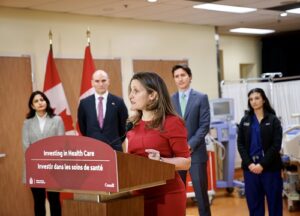Cutting costs or spending more? What Canadians think about the budget
TORONTO – Canadians divided over public spending: what should the federal government focus on in the coming years? On a balanced budget or on aid for families and the economy? The Angus Reid Institute has tried to answer these questions with a survey, starting from a fact: after unprecedented spending during the pandemic, Canada has entered a phase of general crisis that borders on recession, with families in difficulty due to the rising cost of living, so much so that the federal government no longer foresees – as in the past – a balanced budget by 2028, but a deficit of 14 billion dollars in that same year.
In this context, according to the Angus Reid Institute study, one in three Canadians are in favor of increasing public spending to help low-income families and to invest in growth, while a larger group, 45%, would prefer the pursuit of a balanced budget.
Politically, the division is even more palpable. Those who voted for the Liberals and New Democrats are strongly inclined to support the budgetary approach of the governing parties (and therefore their parties), while Bloc Québécois voters are the most divided (24% agree, 44% disagree, 32% unsure). The Conservatives are largely united in their opposition to the current government’s policy.
The federal budget includes – among other things – tens of billions of dollars in cleantech tax credits. Overall, 44% of Canadians say this is a smart measure to make Canada more competitive, particularly after the US increased investment in this sector with its Inflation Reduction Act last year. Due to five (41%), however, there may be a business cost subsidy that Canada should not invest in. Measures such as dental coverage for low-income and uninsured families, an expansion of the GST rebate and the indigenous housing strategy are enthusiastically welcomed. Both former NDP voters and the Liberals are nearly unanimous in their applause for the expansion of dental care, a key priority for the New Democrats in maintaining support for the trust and supply agreement with the Liberals. Three in five former Conservative voters (58%) also say this policy is good.
That said, the scope and breadth of the financial supports are met with some disappointment. Overall, 26% of Canadians say their family will really benefit from the increased GST rebate, but only 51% of those in “terrible” financial shape say so, suggesting a one-off hike is unlikely to fix the their problems. Tax breaks for the cleantech sector are supported by a majority in Quebec (51%) and half in British Columbia (50%), but strongly opposed in Alberta (55%) and Saskatchewan (58%).
Men and women have different opinions about spending. Women are generally more likely to say this is the right path for now (40% to 34%), while men are twice as likely to disagree and say spending levels are too high (57%) than “appropriate” (26%).
One in three Canadians (35%) say the announced dental health benefit will help their family. That includes more than three out of five people whose household income is less than $50,000 a year.
The full study is available here
In the pic above, deputy Prime Minister and Federal Minister of Finance, Chrystia Freeland (photo from Twitter – @cafreeland)




